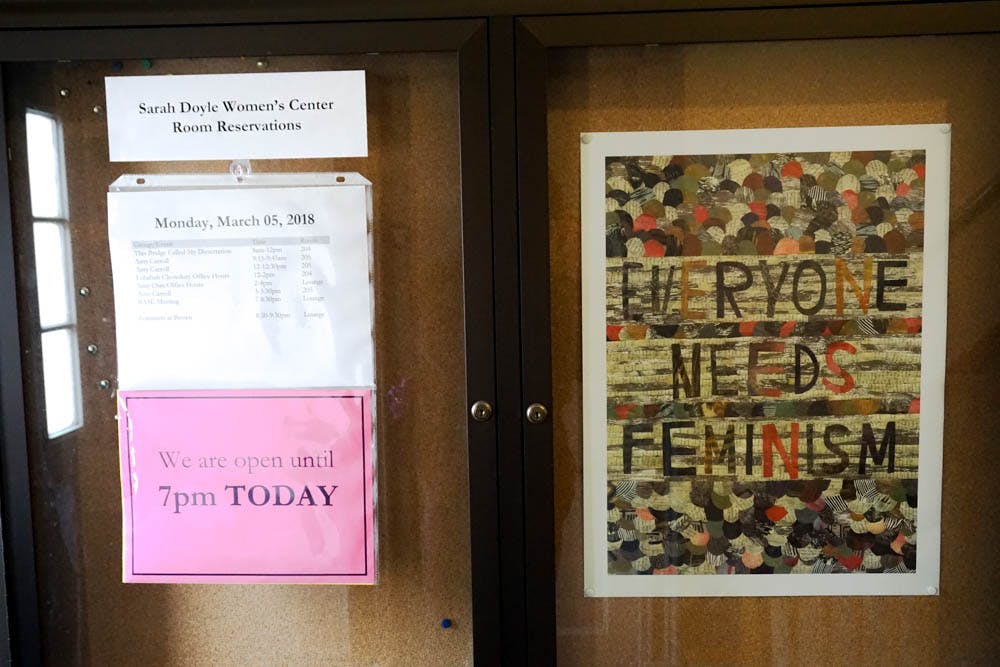Throughout March and April, the Sarah Doyle Women’s Center will host the 2018 Womxn’s History Series, “Remixing Storytelling: Gender, Media and Creative Expression,” which seeks to welcome marginalized identities and “amplify voices that haven’t been heard on campus,” said Giselle Flores Alvarado ’20, one of the series’ progammers.
This year, the series — which is held every March — centers on empowerment through creative expression and features speakers such as queer Latinx writer Gabby Rivera, queer indigenous rapper Dio Ganhdih and LGBTQ+ activist CeCe McDonald.
This programming marks the first time that the SDWC is using the term “womxn” in the series’ title, said Felicia Salinas-Moniz, assistant director of the SDWC. “We’ve always really seen the Women’s Center as being very inclusive around gender, and this was just our way to visually represent that, especially as we’re highlighting speakers who do deal with trans identity,” she added.
The center’s student coordinators for the series, Alvarado and Kara Roanhorse ’18, conceptualized its theme after realizing that the scheduled events contained a common thread of narratives pertaining to marginalized identities. “It’s not just traditional storytelling, like reading a book. It’s activism, it’s recentering history, it’s music, it’s doing social work,” Alvarado said, adding that the series aims to expand the definition of storytelling.
Featured artists in the series — such as the spoken word duo Climbing PoeTree — use storytelling and art to express their identities and further their activism. “Climbing PoeTree uses multimedia art to address themes of racial inequality, environmental injustice, language barriers and carving out a sense of place for oppressed identities,” according to the SDWC’s website.
Along with probing traditional storytelling, the series’ coordinators wanted to question notions of traditional femininity and womanhood through included programming. “I want to challenge racial boundaries and lines and how different communities of womxn and people in general have been made to feel less than,” Alvarado said.
Salinas-Moniz said she wanted to address the role of youth in feminist movements, given that she is currently teaching the American Studies seminar AMST 0170C: “Race, Class and Girlhood.”
“We have programs that are not just dealing with adults, we have programs that are dealing with youth and gender across age,” she said. As one example, the center is inviting Ruth Nicole Brown, assistant professor of gender and women’s studies at the University of Illinois at Urbana-Champaign, to speak about Saving Our Lives, Hear Our Truths, an organization that is “a practice based, publicly engaged, collectively organized space for Black girls to envision Black girlhood anew,” according to the website for the SDWC.
To foster greater community across campus centers, the SDWC collaborated with the LGBTQ Center to organize certain events, such as Climbing PoeTree’s performance, Alvarado said. “Considering Climbing PoeTree’s intentional feminist approach to their art, the Women’s Center seemed like a natural partner to align with in making the events happen,” wrote Je-Shawna Wholley, assistant director for the LGBTQ Center, in an email to The Herald.
Through the series, Salinas-Moniz said she hopes to raise awareness of the SDWC’s ability to be a welcoming space. “It always hurts my heart a little when I meet a senior and they’ve never set foot in the Women’s Center. … We’re really not a space just for students who identify as women, we’re open to the entire campus community.”





